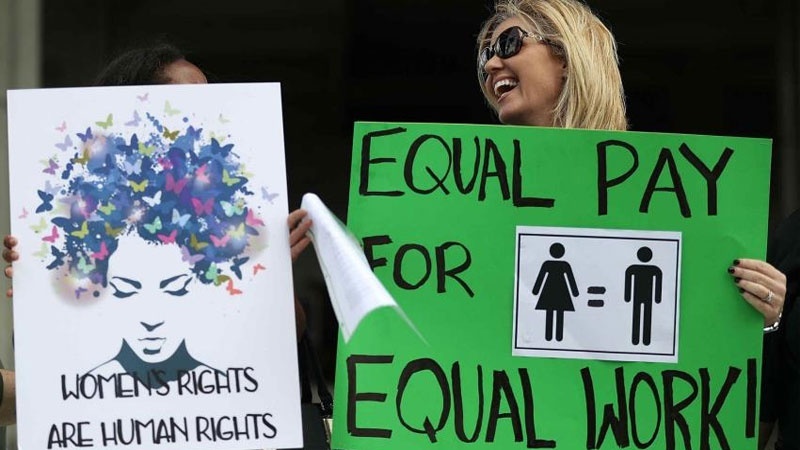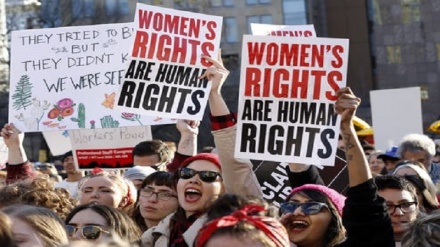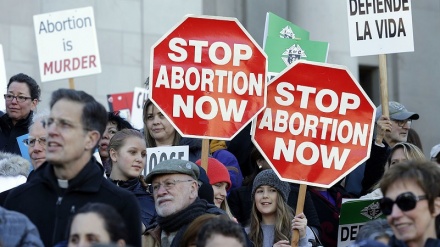Status of Women in the West (14)
Half the World, Half the Power was the motto of the World Women Conference convened by the United Nations during 4–15 September 1995 in Beijing, China. Then in 2000, the heads of states signed the document on Women's Empowerment and Gender Equality as a prerequisite for attaining change and overcoming economic and political problems.
The document determined that totally 30% of the seats of national parliaments be devoted to women. Statistics, however, indicate that women's presence at political posts is notably low in most of the countries and they hold less than 5% of high political positions. This is also true in the western countries which masquerade as the harbingers of gender equality.
The expert of the program, Ms. Akhundan says,
"Studying the statistics and figures on the rate of women's participation, shows that although 99% of women in the world have the right to take part in political currents, the number of women at public and political posts is surprisingly low in most countries. In spite of the gender equality slogans and encouragement of women for political participation by movements of women's rights and feminists, there are several causes for low-profile presence of women in political arena even in the western countries. Due to the dominance of male-oriented culture in political structures with traditional power in the governance, there is no inclination for women's political participation and efforts have been made to decrease the number of women parliamentarians. Moreover, women, because of motherly responsibilities, have confinements which make it impossible for them to discharge full-time political commitments. Thus, the presence of women is low in the jobs that prepare them for politics. Furthermore, women are disheartened by the media that are opposed to their participation."
A brief glance at the history shows that political movements and participation of women in the west began in the 18th century; but towards the end of the 20th century, with the spread of the so-called globalization trend, more efforts were made to consider women's participation in decision-making. Since 1945, in most of the West European countries, women got the right to vote and participate in electoral campaigns with equal conditions compared with men.
Women succeeded, after long struggles, to gain political freedom; yet their share of the political power had just started. Two years after the British women's success in getting the right to vote and garnering more than 30 votes, the leader of "Women's Corporation" referred to gender inequality in political participation, saying, "It is always said that in corporate movements there are equal rights for women and men. Of course, most of the doors are open but all seats are occupied and 9/10 of the laws are in favour of men. Thus, in practice, opportunities are not equal."
Since the 1970s, too, feminist activists paid more attention to the nature of political structures. In their opinion, "The mere ratification of laws cannot transform the presumptions and beliefs that grant continuity to the dominance of men."
Due to the dominance of male-oriented culture in the political structures there is little tendency toward women's participation. In France, where the rate of women's presence in the parliament in 1945 was 6.9% due to the dominance of leftist parties, the figure dropped to 1.6% in 1970 because of coming to power by rightist parties. In late 1980s, there was a major change in the participation of women in political decision-makings; but there was a far distance to fulfill their demands. In Britain, for instance, the ratio of women to men is still low in the executive posts. Although the premiership is in the hand of a woman the number of female secretaries is less than men in the cabinet and the female lawmakers are half of men in the parliament. As for the US, only 6 states have elected female members for the legislature and 22 states have never had a woman in the Senate. The state of Colorado, with 42% females, has the highest number of women at the state leadership; but this state has never enjoyed a woman as governor or Senator. In the parliaments of Germany (both Federal and State) just 11-36 percent of the seats are held by women. Statistics reveal that only three European countries of Iceland, Sweden and Finland are among the top 10 countries in terms of women's number in the parliament; while the figures of Inter-Parliamentary Union (IPU) show that some of the poor African countries, such as Rwanda, have a better status in terms of women's participation in the political scene in comparison with many European countries and the United States.
According to these statistics, the percentage of female lawmakers in Rwanda has passed even those of advanced countries like Sweden which used to rank first for years. After Rwanda, Bolivia ranks second with more than 53% female lawmakers in the parliament. Cuba with nearly 50% is third; Iceland with almost 47% is fourth; Nicaragua with some 46% ranks fifth and Sweden with approximately 43% stands at the sixth position.
Meanwhile, according to IPU Secretary General, Martin Chungong, the reason for Rwanda's going ahead is that basic changes have taken place in the rules and structure of the government after the US-orchestrated genocide in 1994. He maintains that the mentality of people has changed and it is not strange anymore for women to have important political posts.
Such a change has not taken place in many western countries. For instance, a while ago, the French lawmaker, Philipp Lorie, called Veronique Masson, the left-wing lawmaker, as "a hen which parades in the parliament." The word "hen" has a negative connotation for women in the French culture and is usually used to humiliate them. This insult by Philipp Lorie infuriated the French cabinet members. The French minister of culture, enraged at his behavior, called it "pitiable". Speaking to British News Channel, BBC, he said that this conduct showed that there are still many prejudices and gender clichés against female politicians and that some men have not learnt to respect women from an equal position.
What occurred in the French parliament, can be seen in other European countries, too. Recently, some of the European media, such as Politico and Sunday Times in Britain, released reports on scores of sexual harassments against the European female MPs. The acknowledgements of the Swedish Minister of Foreign Affairs, Margot Elisabeth Wallström, on sexual harassment when she was in the office, discloses the severity of the disaster.
According to the experts, the appointment of a few women to the key political posts materialized only when there was no qualified man for the post. For instance, if David Cameron had not resigned or Boris Johnson- the former mayor of London and a Brexit leader- had shown inclination for premiership, this post would hardly ever go to Theresa May. All in all, there is an ocean of distance between the words and actions in the west.
RM/SS



